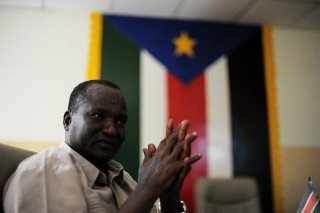Unity State governor: ‘Oil-starved’ Khartoum attacked Jau
By Bonifacio Taban Kuich
February 13, 2012 (BENTIU) – The governor of Unity State in South Sudan disclosed to Sudan Tribune that Khartoum’s forces attacked Jau payam [district] last Friday.

Gai claimed Jau was under attack because Khartoum wants to “close the route” between South Kordofan and Unity state as “the Nuba get support” and fuel from his state.
The Parieng county commissioner Mabeak Lang Bilkuei confirmed the incident saying that four people were injured.
South Kordofan, which borders Unity, is across the international border in north Sudan. SAF is in conflict with the Sudan People’s Liberation Movement – North (SPLM-N) rebels in South Kordfoan, which is populated predominantly by people from the Nuba ethnic group.
Many of the Nuba people fought against Khartoum in the civil war between what are now two Sudans. The war ended with the signing of the Comprehensive Peace Agreement (CPA) in 2005.
As stipulated by the CPA, the South Sudanese voted in a plebiscite in early 2011 which resulted in creation of new state last July.
Ever since the South’s secession, SAF has been battling SPLM-N rebels in Blue Nile and South Kordofan states.
In November 2011 the United Nations (UN) said SAF had “dropped at least two bombs near the Yida refugee camp,” also in Unity State. Yida is providing humanitarian assistance to those fleeing the conflict in South Kordofan.
The UN estimates that 440,000 people have been displaced or “severely affected” by the conflicts in Abyei, Blue Nile and South Kordofan.
The Unity state governor also claimed that Khartoum intends to take control of the oil in his territory. The state is one of the largest oil producers in South Sudan.
South Sudan’s foreign ministry said it was “on the brink of war” after SAF attacked Jau with tanks and aerial bombardment in December 2011.
In a escalation of a disagreement over the payment of transit fees Juba halted its oil production in January 2012. Juba claimed that Khartoum confiscated oil with a market value of US$35 million in lieu of oil transit payments. Negotiations between Juba and Khartoum brokered by the African Union High Level Implementation Panel (AUHIP) are yet to achieve a resolution.
The stakes are high for both; South Sudan, which took 75 percent of the old Sudan’s oilfields with it in secession, is reliant on oil revenues for 95 percent of its budget.
Juba has signed memorandums of understanding with the governments of Kenya and Djibouti on the construction of alternatives pipelines. South Sudan is currently held in a strangle-hold by the pipeline which ends at Port Sudan, on north Sudan’s coast.
Both Khartoum and Juba are implementing austerity measures to manage the economic backlash of the oil crisis.
(ST)
